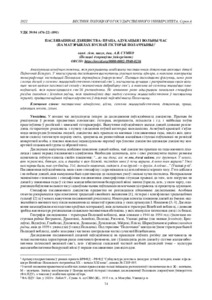Please use this identifier to cite or link to this item:
https://elib.psu.by/handle/123456789/28976| Title: | Пасляваеннае дзяцінства: праца, адукацыя і вольны час (па матэрыялах вуснай гісторыі Полаччыны) |
| Authors: | Сумко, А. В. Sumko, A. |
| Other Titles: | The Post-War Childhood: Work, Education and Leisure (Based on the Materials of the Oral History of Polotsk District) |
| Issue Date: | 2022 |
| Publisher: | Полоцкий государственный университет |
| Citation: | Сумко, А. В. Пасляваеннае дзяцінства: праца, адукацыя і вольны час (па матэрыялах вуснай гісторыі Полаччыны) / А. В. Сумко // Вестник Полоцкого государственного университета. Серия A, Гуманитарные науки. - 2022. - № 1. – С. 74-81. |
| Abstract: | Аналізуюцца асноўныя сюжэты, якія раскрываюць асаблівасці пасляваеннага дзяцінства вясковых дзяцей Паўночнай Беларусі. У якасці крыніц даследавання выступаюць уласныя запісы аўтара, а таксама матэрыялы этнаграфічных экспедыцый Полацкага дяржаўнага ўніверсітэта. Палявыя даследаванні фіксуюць, што роля і месца дзецей у сістэме жыццезабеспячэння сялянскай сям’і, магчымасць вучыцца і распраджацца сваім воль- ным часам цалкам залежалі ад складу і эканамічнага дабрабыту сям’і, а таксама ад сістэмы жыццёвых каш- тоўнасцей, якія трансліраваліся сям’ёй рэспандэнта. Не апошнюю ролю адыгрывала занальная спецыфіка рэгіёна (заходнія і ўсходнія раёны, якія прадстаўлялі дзве мадэлі сістэмы жыццезабеспячэння ў пасляваенны перыяд), прадвызначыўшая пэўныя адрозненні ў дзіцячай паўсядзённасці Полаччыны.=The article analyzes the main plots that reveal the peculiarity of the post-war childhood of the village children in Northern Belarus. The research sources are the author's own records and materials from the ethnographic expeditions of Polotsk State University. The field studies record that the role and place of children in the life support system of a peasant family, the ability to study and use their free time completely depended on the family composition and economic well-being, as well as on the system of life values of the respondent's family. The zonal specificity of the region (the western and eastern regions, representing two models of the life support system in the post-war period), which predetermined significant differences in children's everyday life in Polotsk region, played an important role. |
| URI: | https://elib.psu.by/handle/123456789/28976 |
| metadata.dc.rights: | open access |
| Appears in Collections: | 2022, № 1 |
Items in DSpace are protected by copyright, with all rights reserved, unless otherwise indicated.
